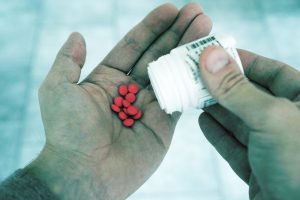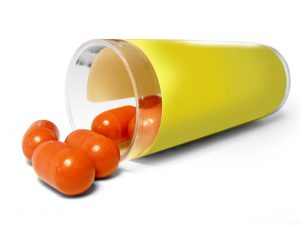How to Dispose of Old Medicine

Spring-cleaning shouldn’t stop with closets and utility drawers overflowing with post-it notes. Every area of the house needs a thorough cleaning from time to time, especially the medicine cabinets.
When was the last time you cleaned out your medicine cabinet of expired medicines or prescriptions for old injuries and ailments? Here’s a better question — when was the last time your aging parents did a deep dive into the contents of their bathroom? If you can’t remember then an extensive purging is far overdue.
Older adults and primary caregivers must remove expired, unwanted, or unused medicines from their home as quickly as possible. It reduces the chances of people taking the wrong combinations, or worse, dangerous pills getting into the wrong hands.
Here are the proper steps to take with expired or unwanted medicines to reduce the chances of mistakes or mishaps.
Read the Label
Before tossing medicine straight into the trash, be sure to read the label. A small number of prescriptions may be harmful, and in some cases fatal, if even just a single dose is used by a person other than the prescribed patient. To prevent accidental exposure or ingestion, find a medicine take-back program in your area. If this disposal option isn’t available, the medicine should be flushed down the toilet.
Participate in Medicine Take-Back Programs
 Medicine take-back programs are an easy way to dispose of every unneeded medicine. The U.S. Drug Enforcement Administration sponsors drug take-back programs nationwide. Whether it’s a permanent collection box or a 24-hour pop-up event, these sites are set up for the safe disposal of prescription drugs. Local groups, such as police departments or hospitals, may also sponsor medicine take-back programs in your area.
Medicine take-back programs are an easy way to dispose of every unneeded medicine. The U.S. Drug Enforcement Administration sponsors drug take-back programs nationwide. Whether it’s a permanent collection box or a 24-hour pop-up event, these sites are set up for the safe disposal of prescription drugs. Local groups, such as police departments or hospitals, may also sponsor medicine take-back programs in your area.
Contact DEA-Authorized Collectors
Another option is to transfer unused pills, drops, and tonics to authorized collectors designated by the DEA. These collectors are mainly responsible for disposal of pharmaceuticals containing controlled substances or IV needles since most take-back programs do not accept them. Authorized collection sites include retail pharmacies, hospitals, or law enforcement locations. Some collection sites may also offer mail-back programs or collection receptacles.
Toss it in the Trash
Although it’s not the safest option, certain medications can be disposed of in the household trash only as a last resort. If the prescriptions are suitable for tossing, never throw out the entire bottle. First, scratch out all personal information on the prescription label to make it unreadable and dispose of the container. Next, mix the pills with unpalatable substances like dirt, used cat litter, or old coffee grounds. You can then put the mixture into a container or sealed plastic freezer bag and throw it in with the household trash. Do not crush tablets or capsules.
only as a last resort. If the prescriptions are suitable for tossing, never throw out the entire bottle. First, scratch out all personal information on the prescription label to make it unreadable and dispose of the container. Next, mix the pills with unpalatable substances like dirt, used cat litter, or old coffee grounds. You can then put the mixture into a container or sealed plastic freezer bag and throw it in with the household trash. Do not crush tablets or capsules.
Preventative Steps Moving Forward
It’s important to keep track of all medications, even for aging parents, to prevent future issues. Always keep medicine secure and out of reach of toddlers, a family pet, curious children or experimental teens, and even visiting houseguests.
- Take an inventory of the medicine in your home every six months.
- Always check the expiration date on the bottle or package, even for things like eye and ear drops.
- Discard leftover prescriptions from previous illnesses or conditions as soon as you’ve fully recovered.
- Never try to treat yourself – or anyone else – with unused prescriptions.
For more information, check the official DEA website about drug disposal, National Prescription Drug Take-Back Day events and locations for DEA-authorized collectors in your area.
Leave a Comment
